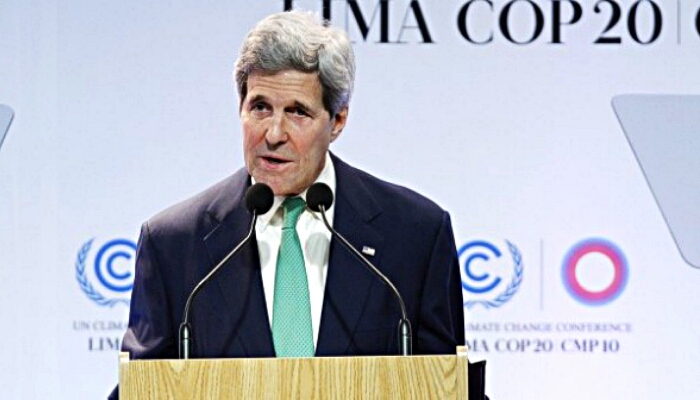Thanking the government of Peru for hosting the UN Climate Change Conference, or COP20, John Kerry applauded the delegates for their hard work to bring global warming under control. Approving the draft text of the climate treaty in Peru was a critical stepping stone to the agreement that must be reached in Paris next year.
Addressing the critical need for climate change action, Secretary of State John Kerry offered strong argument to climate change deniers. Bringing the issue closer to home, Kerry pointed out the realities of climate change that Peru is currently facing.
John Kerry: “Climate Change is Personal”
“Now for Peru, climate change is personal,” said John Kerry. “It will determine whether future generations will know Peru as we know it today, as we have known it, or whether today’s treasures are confined to history.” He encouraged the conference attendees to “Think about it: Peru is home to 70 percent of the world’s tropical glaciers, to nearly all of the world’s major ecosystems, and to more fish species than any other country on earth.”
Continuing, Kerry noted, “But already, almost half the volume of many glaciers has melted away just in the last 30 years or so. Ecosystems are visibly being destroyed before our eyes. And fisheries are threatened. So this is not just a fight by Peru; it is a fight for Peru.”
Global Challenges Know No Borders
Secretary Kerry pointed out that global threats and challenges “know no borders.” Comparing with terrorism, extremism, epidemics, poverty, and nuclear proliferation, “climate change absolutely ranks up there equal with all of them.”
Adding a challenge of his own, Kerry announced, “I challenge anyone who has thought about the science or listened – actually listened carefully to national security experts tell us that these dangers are real – I challenge them to tell us otherwise and to show us otherwise.”
Holding his ground, Kerry stated, “I’m privileged to be here as President Obama’s lead international advocate that this issue should be personal for absolutely everybody – man, woman, child, businessperson, student, grandparent.”
He continued, “Wherever we live, whatever our calling, whatever our personal background might be, this issue affects every human on the planet, and if any challenge requires global cooperation and effective diplomacy, this is it.”
“This is Pretty Logical Stuff”
“Scientists agree,” said John Kerry, “that the emission of climate pollutants like carbon dioxide, methane, soot, hydrofluorocarbons all contribute to climate change.” He added, “Without a greenhouse effect, life wouldn’t exist, and if the greenhouse effect is good enough to provide you with life itself, obviously, logic suggests that it’s also going to act like a greenhouse if you add more gases and they’re trapped and you heat up the earth.”
“This is pretty logical stuff,” John Kerry pointed out, “and it’s astounding to me that even in the United States Senate and elsewhere, we have people who doubt it.”
The Solution is Energy Policy
“Mankind is creating the problem, and mankind can solve the problem.” Kerry continued, “And unlike some problems that we face, this one already has a ready-made solution provided by mankind that is staring us in the face: The solution to climate change is energy policy.”
Confidently stubborn the Secretary stated, “We can significantly cut emissions and prevent the worst consequences of climate change from happening. And anyone who tells you otherwise is just plain wrong, period. The science shows that at this moment there still is a window.” He added, “there is time for us to change course and avoid the worst consequences – but the window is closing quickly.”
Pointing out the recent U.S. adoption of “by far the most ambitious set of climate change actions,” Kerry noted that the goal of reducing emissions from 26 to 28 percent, from 2005 levels, by 2025 “will put us squarely on the road to a more sustainable and prosperous economy. And the upper end of this target would also enable us to cut our emissions by 83 percent by 2050 – which is what science says we need to do to meet the goal of preventing over 2 degrees of Celsius warming.”
But is it Enough?
“Now, we’re proud of this target,” reported John Kerry, “and we’re grateful that with the targets that China and the EU have also announced, we now have strong commitments from the three largest emitters in the world.” But then Kerry asked, “Is it enough? No. But it’s the beginning, which begins to move the economy and begins to move businesses and move decisions in the direction we need to go.”
He pointed out, “Coal and oil may be cheap ways to power an economy today in the near term, but I urge nations around the world – the vast majority of whom are represented here, at this conference – look further down the road. I urge you to consider the real, actual, far-reaching costs that come along with what some think is the cheaper alternative. It’s not cheaper.”
“Think About the Economic Impacts”
“I urge you to think about the economic impacts related to agriculture and food security,” he said, pointing out that scientists estimate that climate change will reduce the yield of grain crops by two percent every decade.
“Think about what that means for millions of farmers around the world,” said John Kerry, “and the impact it will have on food prices on almost every corner of the world, and particularly as each decade we see the world’s population rise towards that 9 billion mark. Then factor in how that would also exacerbate the human challenges like hunger and malnutrition.”
Secretary Kerry also pointed to other significant problems stemming from relying on 20th century energy sources, noting that “air pollution caused by the use of fossil fuel contributes to the deaths of at least 4.5 million people every year and all the attendant healthcare costs that go with it.”
“Do the Math on the Costs”
“And for everyone thinking that you can’t afford this transition or invest in alternative or renewable energy,” John Kerry urged, “do the real math on the costs. Consider the sizable costs associated with rebuilding in the wake of every devastating weather event. In 2012 alone, extreme weather events cost the United States $110 billion.”
Turning to weather events overseas, Kerry added, “When Typhoon Haiyan hit the Philippines last year, the cost of responding to the damage exceeded $10 billion. Even smaller-scale disasters bear a hefty price tag, and the overall cost to businesses from the severe floods that hit parts of the United Kingdom earlier this year was an estimated 1.3 billion.”
Kerry pointed out that with the costs of damages, “You start adding up these 100 billions and 10 billions here in country after country,” and start to wish “that money had been put to helping to subsidize the transition to a better fuel, to an alternative or renewable, to cleaner, to emissions-free, to clean emissions capacity.” And then he pointed out, “Those are just the costs of damages.”
“So my friends,” John Kerry concluded, “it’s time for countries to do some real cost accounting.”
The Cost of Clean Energy Now is Cheaper Than the Consequences of Climate Change Later
“The bottom line is that we can’t only factor in the cost of immediate energy need or energy transition.” The Secretary said, “We have to factor in the long-term cost of carbon pollution. And we have to factor in the cost of survival itself. And if we do, we will find that the cost of pursuing clean energy now is far cheaper than paying for the consequences of climate change later.”
Kerry reminded, “Nicholas Stern showed us that in a study any number of years ago. And we still need to get all of our countries more serious about doing that accounting.”
Framing the economic debate, John Kerry stated, “This is a choice between growing or shrinking your economy. And what we don’t hear enough of is the most important news of all, that climate change presents one of the greatest economic opportunities of all time on earth.”
The Global Energy Market of the Future
“The global energy market of the future,” said Secretary Kerry, “is poised to be the largest market the world has ever known.” Pointing out that, with 4 to 5 billion users, today’s energy market is worth $6 trillion, but the number of consumers is projected to rise to 9 billion.
“Between now and 2035, investment in the energy sector is expected to reach nearly $17 trillion.” John Kerry continued, “And that’s without us giving some of the price signals that we ought to be giving to the marketplace to make this transition. That’s more than the entire GDP of China and India combined. Imagine the opportunities for clean energy innovation. Imagine the businesses that could be launched, the jobs that’d be created, in every corner of the globe.”
“None of This is Beyond Our Capacity”
Kerry brought the present back into focus, saying, “The only question is are we going to do it fast enough to make the difference. The technology is out there. Make no mistake, it’s out there now. None of this is beyond our capacity.” The question “is whether or not it’s beyond our collective resolve.”
Secretary Kerry is a veteran of climate change debates, and to his credit he is still passionate. “The science of climate change is science, and it is screaming at us, warning us, compelling us – hopefully – to act.” He pointed out the considerable testimony that, over 20 years, 97 percent of peer-reviewed climate studies confirm that climate change is happening and that human activity is responsible.
“I’ve been involved, as many of you have, in public policy debates for a long time,” John Kerry reminded. “It’s pretty rare to get a simple majority or a supermajority of studies to say the same thing, but 97 percent over 20-plus years – that is a dramatic statement of fact that no one of good conscience or good faith should be able to ignore.”
This is Not Just an Abstract Debate
“Rest assured,” Kerry cautioned, “if we fail, future generations will not and should not forgive those who ignore this moment, no matter their reasoning. Future generations will judge our effort not just as a policy failure, but as a massive, collective moral failure of historic consequence, particularly if we’re just bogged down in abstract debates.”
Kerry continued pointedly, “They will want to know how we together could possibly have been so blind, so ideological, so dysfunctional, and frankly, so stubborn that we failed to act on knowledge that was confirmed by so many scientists in so many studies over such a long period of time and documented by so much evidence.”
“The truth is,” said John Kerry, “we will have no excuse worth using.”
(Note: This article is only a partial record of Secretary of State John Kerry’s speech. Please click here for a complete transcript.)




